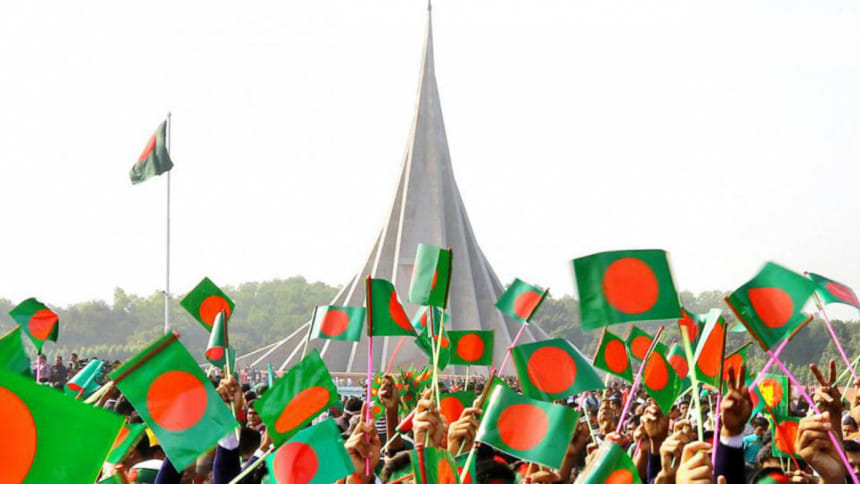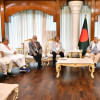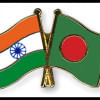Our constitution and the goals of independence

The Constitution which we adopted on November 4, 1972 and which came into force on December 16, 1972 is unquestionably the outcome of our victory in the Liberation War, won at the cost of countless lives. It bears the signatures of Bangabandhu Sheikh Mujibur Rahman, Syed Nazrul Islam and Tajuddin Ahmad.
During the four decades, people lost power, often through violent interventions, resulting in controversial changes made in the Constitution. We can, however, proudly say that people steadfastly struggled to uphold the fundamentals of the Constitution, as adopted in 1972. This struggle was reflected in challenges to the validity of these amendments in court and through democratic movements. We can derive satisfaction from the fact that the Constitution has survived for over four decades. We, thus, have the opportunity today to assess the extent to which the goals of the Constitution have been realised.
A Constitution has been described as the autobiography of a nation which reflects its historical experience. To adopt the language of Justice Albie Sachs, one of the architects of the Constitution of present-day South Africa, "If a Constitution is the autobiography of a nation, then we are the privileged generation that will do the writing. It is something that involves us all ... no one gives us rights, we gain them in struggle. They exist in our hearts before they exist in paper."
The national unity which had brought us victory in 1971 was based on shared values and a shared vision of the kind of state and society which we aspired for—a state which would be truly democratic, which would empower citizens to exercise state power at all levels through their elected representatives. We dreamt of a democratic political order in which power would belong to the people, to be exercised through a sovereign parliament composed of representatives elected on the basis of universal adult franchise.
For the proper functioning of a multi-party democracy, a Constitution builds in checks and balances and provides for independent institutions to ensure accountability. These include an independent judiciary and independent constitutional bodies such as the Election Commission and the Public Service Commission. Constitutional provisions are made to enable an effective opposition to play its role in Parliament (a) for monitoring and evaluating government actions, (b) for effective debates in Parliament to enable citizens to be aware of the issues involved, and (c) for public opinion to influence the formulation of policies. Active parliamentary committees are intended to enhance the capacity of members to participate in the work of the Parliament. For the rule of law to be sustained, the Constitution provides for impartial application of laws by law enforcement agencies that are free from interference and influence, in particular, from the executive and the ruling political party.
The basic structure of the Constitution, that is, the fundamental pillars upon which our 1972 Constitution rests, is the following. First is a representative democracy for which a free and fair election is a precondition. This in turn requires neutrality of the Election Commission and fairness of the election through a process where individual voters can be assured that they can vote freely and fairly without any influence of money, muscle or manipulation. The effective enforcement of this law requires, as in a cricket game, fairness and impartiality of the umpire, to have an Election Commission truly impartial/neutral. Second, and critically important, are the rule of law and independence of the judiciary—not only electoral laws but also laws that guarantee the right to vote, freedom of association, protection from arbitrary arrest and freedom of speech. Any violation should be redressed by an independent judiciary.
The independence of the judiciary clearly requires institutional impartiality and neutrality so that the exercise of judicial power is not influenced by partisanship of the political party. These preconditions for the constitutional order envisaged by the 1972 Constitution require that the process of appointment of judges of the Supreme Court and of members of the Election Commission must ensure that judges of the SC and members of the EC are neutral and can independently exercise their powers.
The economic and social justice mandated by the Constitution for promoting equality within our society also awaits effective implementation. Article 29 has expressly provided for equality of opportunity for public employment. Public concern has been expressed at the disparities that have grown between cities and the rural areas where the overwhelming majority of people live. Equal concern has been expressed about concentration of the benefits of economic growth and of the ownership of assets in the hands of a privileged elite.
Today, our experience of over four decades tells us that it was a historic consensus that enabled us to give to ourselves the 1972 Constitution. Indeed, after more than 40 years, its continued functioning requires consensus, and indeed, if amendments are to be made, it is imperative that they are not to be made hurriedly and on the basis of partisan interest of political parties, but are based upon a national consensus arrived at through discussion, deliberations and dialogue, reinforcing the national unity through which we won our independence and which enabled us to adopt the 1972 Constitution.
Dr Kamal Hossain is the chief of Jatiya Oikyafront. He was the chairman of the Constitution Drafting Committee formed in 1972.










Comments